1 Samuel 6 meaning explained in AI Summary
The Philistines, plagued by tumors and misfortunes after capturing the Ark of the Covenant, decide to return it to Israel after seven months.
of their actions:
- Seeking Guidance (v. 1-9): Unsure how to appease the God of Israel, the Philistine priests and diviners advise them to return the Ark with a guilt offering of five golden tumors and five golden rats, representing the plagues they suffered. They also suggest placing the Ark on a cart pulled by two milk cows, with their calves penned up separately. If the cows head straight towards Israelite territory (Beth-shemesh), it confirms Yahweh is behind their troubles.
- Preparing the Offering (v. 10-15): The Philistines follow the instructions, placing the Ark and the golden offerings in a chest on the cart. The cows, lowing in distress from being separated from their calves, miraculously head straight towards Beth-shemesh.
- Israel's Rejoicing (v. 16-18): The Israelites working in the fields rejoice at the sight of the returning Ark. The cart stops in the field of Joshua of Beth-shemesh.
- The Ark's Reception (v. 19-21): The men of Beth-shemesh offer the cows as a burnt offering to God. However, their curiosity gets the better of them, and they look inside the Ark. This act of disrespect angers God, and He strikes down seventy men. The people mourn and question why God's power is so fierce.
Overall, Chapter 6 highlights the power of the Ark and the reverence it demands. It shows that even the Philistines, despite their victory in battle, recognize the might of the God of Israel. However, it also serves as a warning against treating holy things casually, as seen in the tragic fate of the men of Beth-shemesh.
1 Samuel 6 bible study ai commentary
The Ark of the Covenant, God's throne on earth, returns to Israel not by human might but by divine power. This chapter reveals the sovereignty and untamable holiness of Yahweh, which is a source of blessing for the repentant and reverent, but a consuming fire for the presumptuous, whether Philistine or Israelite. It demonstrates that God is not a territorial deity to be captured or manipulated but is the Lord of all nations and nature, whose presence demands awe and obedience.
1 Samuel 6 Context
The setting is after the Ark has been in Philistia for seven months, having inflicted plagues on Ashdod, Gath, and Ekron, and toppled their idol, Dagon. Philistine culture, like other Ancient Near Eastern societies, relied on priests and diviners to interpret divine wrath and prescribe appeasement rituals. These often involved sympathetic magic, creating images of an affliction to offer to the deity. The chapter leverages this pagan worldview to create a test that, from their perspective, would irrefutably prove whether Yahweh was the source of their suffering. Israel, on the other hand, had specific Mosaic laws for handling the Ark (the responsibility of the Kohathite Levites), which had been neglected, setting the stage for the chapter's tragic conclusion.
1 Samuel 6:1-3
The ark of the LORD was in the country of the Philistines for seven months. And the Philistines called for the priests and the diviners and said, “What shall we do with the ark of the LORD? Tell us with what we shall send it to its place.” They said, “If you send away the ark of the God of Israel, do not send it empty, but by all means return him a guilt offering. Then you will be healed, and it will be known to you why his hand has not been removed from you.”
In-depth-analysis
- Seven Months: A significant period of judgment. Seven often symbolizes divine completion or fulfillment in the Bible. The Philistines have endured God's judgment to its full measure.
- Priests and the Diviners: The Philistines turn to their spiritual experts, the highest religious authorities in their culture. However, unlike their dealings with Dagon, their advice demonstrates fear and uncertainty, revealing their powerlessness before Yahweh.
- Guilt Offering ('asham): The diviners use a specific Hebrew term for an offering meant to atone for a trespass or desecration (Lev 5:14-19). They acknowledge they have wronged the "God of Israel" and must make restitution. This is a pagan imitation of a Mosaic ordinance.
- The diviners' logic is a mix of theology and experiment: propitiate the deity with a gift, and if the plague stops, you have confirmation that this deity was the cause.
Bible references
- Leviticus 5:15: "If anyone commits a breach of faith and sins unintentionally in any of the holy things of the Lord, he shall bring to the Lord as his compensation, a ram without blemish... for a guilt offering." (The principle of a guilt offering for desecrating holy things, which the Philistines are mimicking).
- Micah 6:6-7: "With what shall I come before the LORD...? Shall I come before him with burnt offerings... Will the LORD be pleased with thousands of rams...?" (Shows the universal human question of how to appease an offended God, contrasted with God's true requirement of justice and mercy).
Cross references
- Num 18:1 (priestly responsibility for holy things); Jos 7:1 (Achan's trespass); Isa 2:8 (idolatry).
1 Samuel 6:4-6
And they said, “What is the guilt offering that we shall return to him?” They answered, “Five golden tumors and five golden mice, according to the number of the lords of the Philistines, for the same plague was on all of you and on your lords. So you must make images of your tumors and images of your mice that ravage the land, and give glory to the God of Israel. Perhaps he will lighten his hand from off you and your gods and your land. Why should you harden your hearts as the Egyptians and Pharaoh hardened their hearts? After he had dealt severely with them, did they not send the people away, and they departed?
In-depth-analysis
- Five Golden Tumors/Mice: An act of sympathetic magic common in the ancient world. The offering visually represents the plague God sent. The number five corresponds to the five major Philistine cities (Ashdod, Gaza, Ashkelon, Gath, Ekron), signifying a corporate offering from the entire nation.
- Tumors (
ophel) and Mice (akbar): The affliction was likely bubonic plague, which is carried by fleas on rodents and causes swollen lymph nodes (buboes or tumors). The mice represent both the source of the plague and a separate scourge destroying their crops. - Give glory to the God of Israel: An astonishing command from pagan priests. It is an explicit acknowledgment of Yahweh's supreme power and their god's impotence. To "give glory" means to acknowledge the truth of His power and righteousness.
- Harden your hearts as the Egyptians: The Exodus narrative had become a famous, cautionary tale among the surrounding nations. The Philistine priests use it as the definitive example of the futility of resisting Yahweh's power.
Polemics
The command to give glory to Yahweh is a direct polemic against the Philistine pantheon, especially Dagon. Their own religious leaders admit Dagon's defeat and point to Yahweh's historical acts (the Exodus) as proof of His unmatched power. It validates the central claim of Israelite faith: Yahweh is not just a tribal god, but the God over all.
Bible references
- Joshua 7:19: "Then Joshua said to Achan, 'My son, give glory to the LORD, the God of Israel, and give praise to him.'" (Giving glory is tied to confession and acknowledging God's righteous judgment).
- Exodus 8:15: "But when Pharaoh saw that there was a respite, he hardened his heart and would not listen to them..." (The direct parallel explicitly stated by the Philistine priests).
- Romans 1:21-23: "For although they knew God, they did not honor him as God or give thanks to him... and exchanged the glory of the immortal God for images resembling mortal man and birds and animals and creeping things." (Describes the pagan practice of making images, here used ironically to honor the true God).
Cross references
- Psa 78:42-51 (recounting plagues on Egypt); Rev 11:13 (giving glory to God after judgment).
1 Samuel 6:7-9
Now then, take and prepare a new cart and two milk cows that have never been yoked, and yoke the cows to the cart, but take their calves home, away from them. And take the ark of the LORD and place it on the cart and put the golden articles that you are returning to him as a guilt offering in a box by its side. Then send it off and let it go. And watch. If it goes up on the way to its own land, to Beth-shemesh, then it is he who has done us this great harm, but if not, then we shall know that it was not his hand that struck us; it happened to us by chance.”
In-depth-analysis
- This is a near-perfect empirical test, designed to eliminate any explanation other than divine intervention. Every element goes against nature:
- New Cart: Untouched by previous common use, fit for a sacred purpose.
- Milk Cows: Nursing mothers whose powerful maternal instinct would drive them back to their bellowing calves.
- Never Been Yoked: Untrained animals that would be unruly, unlikely to walk in unison or on a straight path.
- Calves Taken Home: This maximizes the cows' instinct to return, not walk away.
- Direction: A specific, direct route to an Israelite town (Beth-shemesh).
- Chance (miqreh): This is the alternative hypothesis. The Philistine diviners are setting up a binary test: either it is the hand of Yahweh or it is a random, unfortunate coincidence. This reveals their worldview, which has a category for uncaused, random events, in contrast to the biblical worldview of God's complete sovereignty.
Bible references
- 2 Samuel 6:3: "And they carried the ark of God on a new cart..." (David later copies this Philistine method of transport, leading to the death of Uzzah, demonstrating that even good intentions using improper methods are unacceptable to God).
- Mark 11:2: "...on which no one has ever sat..." (A young donkey, unused and thus set apart, is specified for Jesus' Triumphal Entry, echoing the "new cart" and "never yoked" principle for sacred use).
Cross references
- Num 19:2 (red heifer without blemish or yoke); Deut 21:3 (unworked heifer); Eccl 9:11 (the idea of "time and chance").
1 Samuel 6:10-16
The men did so... and the cows went straight in the direction of Beth-shemesh along one highway, lowing as they went. They turned neither to the right nor to the left. And the lords of the Philistines went after them as far as the border of Beth-shemesh... And when the five lords of the Philistines saw it, they returned that day to Ekron.
In-depth-analysis
- The Miracle: The cows defy every natural instinct. They walk straight, together, on a direct path away from their calves. This is Yahweh's undeniable signature on the event.
- Lowing as they went: This detail is crucial. The sound is one of distress, highlighting that they are acting against their own nature. They are sacrificing their maternal desire in submission to a higher power. It's not a peaceful stroll; it is a compelled, miraculous journey.
- The Lords... went after them: The Philistine leaders act as official witnesses. They follow the entire way to the border, confirming the test results for their people. Their presence verifies the miracle, leaving no room for doubt or excuse. Yahweh provides testimony to His enemies through their own test.
- Beth-shemesh: An Israelite border town, a city assigned to the Levites (Josh 21:16). The Ark is returning to its priestly custodians.
- Wheat Harvest: A time of celebration and abundance, which is now magnified by the return of the symbol of God's presence.
- Great Stone ('eben gedolah): This natural landmark becomes an impromptu altar. The people respond with immediate, albeit procedurally flawed, worship.
- The Levites: Men from the tribe of Levi are present, and they correctly handle taking the Ark off the cart.
Bible references
- Joshua 21:16: "[The priests] were given... Beth-shemesh with its pasturelands..." (The Ark was divinely guided to a Levitical city, a place it was supposed to be).
- Judges 13:19-20: "So Manoah took the young goat... and offered it on the rock to the LORD, and the angel did an amazing thing while Manoah and his wife watched." (Using a great rock as an impromptu altar for a divine encounter).
Cross references
- 1 Sam 7:12 (Samuel's Ebenezer stone); Isa 43:12 ("you are my witnesses").
1 Samuel 6:17-19
These are the golden tumors that the Philistines returned as a guilt offering to the LORD: one for Ashdod, one for Gaza, one for Ashkelon, one for Gath, one for Ekron. And the golden mice, according to the number of all the cities of the Philistines belonging to the five lords... But he struck some of the men of Beth-shemesh, because they had looked into the ark of the LORD. He struck seventy men of them, and the people mourned because the LORD had struck the people with a great slaughter.
In-depth-analysis
- Looked Into the Ark: This was the great transgression. The Ark was not a mere object of curiosity or a trophy. It represented the very throne and presence of the incomprehensibly holy God. To gaze upon it was forbidden on pain of death. Their joy led to a fatal irreverence and presumption.
- The Number Struck: The Hebrew text literally reads "he struck among the people seventy men, fifty thousand men." The number 50,070 is impossibly high for a small town like Beth-shemesh. Most scholars, and modern translations like the ESV and NIV, conclude that "fifty thousand men" is a later scribal gloss or error. The original, more credible number is seventy men. The number 70 is theologically significant (the elders of Israel, the years of exile).
- The Lesson: God’s holiness is terrifying and absolute. His presence cannot be treated casually. The very object that brought judgment on the Philistines for sacrilege now brings judgment on the Israelites for the same reason. God plays no favorites when it comes to His holiness.
Bible references
- Numbers 4:20: "...but they shall not go in to look on the holy things even for a moment, lest they die." (The explicit prohibition the men of Beth-shemesh violated. This applied even to the Levites who carried the Tabernacle furnishings).
- 2 Samuel 6:6-7: "And when they came to the threshing floor of Nacon, Uzzah put out his hand to the ark of God and took hold of it... and God struck him down there for his error, and he died there beside the ark of God." (The most famous parallel, where improper handling, not just looking, resulted in death).
- Hebrews 12:28-29: "...let us offer to God acceptable worship, with reverence and awe, for our God is a consuming fire." (A New Testament echo of the lesson learned at Beth-shemesh).
Cross references
- Exo 19:21 (warning not to gaze at Sinai); Lev 10:1-3 (Nadab and Abihu); 1 Cor 11:29-30 (judgment for partaking in communion unworthily).
1 Samuel 6:20-21
Then the men of Beth-shemesh said, “Who is able to stand before the LORD, this holy God? And to whom shall he go up away from us?” So they sent messengers to the inhabitants of Kiriath-jearim, saying, “The Philistines have returned the ark of the LORD. Come down and take it up to you.”
In-depth-analysis
- Who is able to stand? This is the correct, terrifying conclusion. They move from presumptuous joy to profound awe. Their question hangs over the rest of the Old Testament and is ultimately answered in the person of Jesus Christ, the mediator who allows humanity to stand before a holy God.
- "This holy God": They recognize the core attribute that demands such reverence. Holiness means to be "set apart," other, different, and pure.
- Kiriath-jearim: They seek another town to take on the fearsome responsibility of housing the Ark. Kiriath-jearim ("city of forests") was on a hill, a "high place," perhaps considered more fitting. It was also a Gibeonite city (Josh 9:17) that had been incorporated into Judah. The Ark would remain there for 20 years (1 Sam 7:2).
Bible references
- Malachi 3:2: "But who can endure the day of his coming, and who can stand when he appears? For he is like a refiner's fire..." (The same question asked by the prophet in anticipation of God's coming).
- Luke 5:8: "But when Simon Peter saw it, he fell down at Jesus’ knees, saying, 'Depart from me, for I am a sinful man, O Lord.'" (Peter's reaction to witnessing Jesus' divine power mirrors the fear and sense of unworthiness of the men of Beth-shemesh).
- Revelation 6:15-17: "Then the kings of the earth... hid themselves... calling to the mountains and rocks, 'Fall on us and hide us from the face of him who is seated on the throne... for the great day of their wrath has come, and who can stand?'" (The ultimate eschatological fulfillment of this question).
1 Samuel chapter 6 analysis
- The Theology of Presence: This chapter radically redefines divine presence. God is not contained in a box. The Ark is where He chooses to manifest His presence, but His power is universal. His presence is a dual reality: an immense blessing for the humble but a deadly danger for the proud and irreverent.
- Typology of the Cows: The nursing cows can be seen as a type of costly, living sacrifice. They move against their strongest natural desires ("lowing" in distress) to fulfill a divine purpose, much like believers are called to sacrifice their own desires to follow Christ's will (Rom 12:1-2).
- Polemic Against Idolatry: The entire narrative is a contrast between the living God and dead idols. Dagon had to be propped up (ch 5), while Yahweh directs his own chariot, controls nature, and executes judgment. Pagan priests can only guess at His ways, while He makes His power undeniable.
- Israel's Failure: The incident at Beth-shemesh reveals how far Israel had fallen from its own covenant law. Knowledge of God's commands for handling the Ark (Num 4) had been lost or ignored. Their enthusiasm for the Ark's return was not matched by the necessary reverence, a persistent problem for Israel.
1 Samuel 6 summary
The Philistines, plagued by God, return the Ark of the Covenant through an ingenious test involving nursing cows that miraculously confirms Yahweh's power. The Ark's arrival in the Israelite town of Beth-shemesh brings joy followed by tragedy, as seventy men are struck dead for irreverently looking inside it. The chapter powerfully establishes the universal sovereignty and terrifying holiness of God, teaching both pagans and Israelites that He cannot be controlled or treated casually, and His presence demands absolute reverence.
1 Samuel 6 AI Image Audio and Video
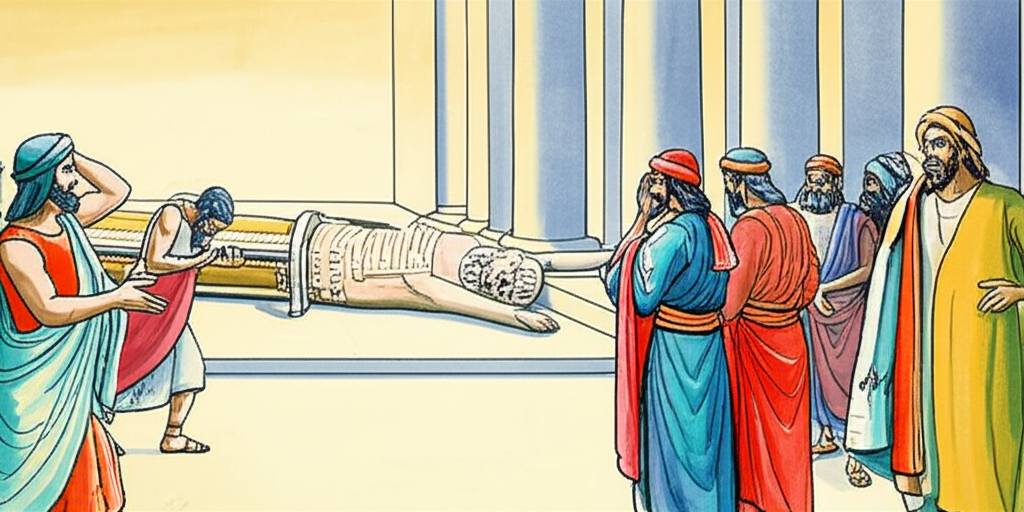
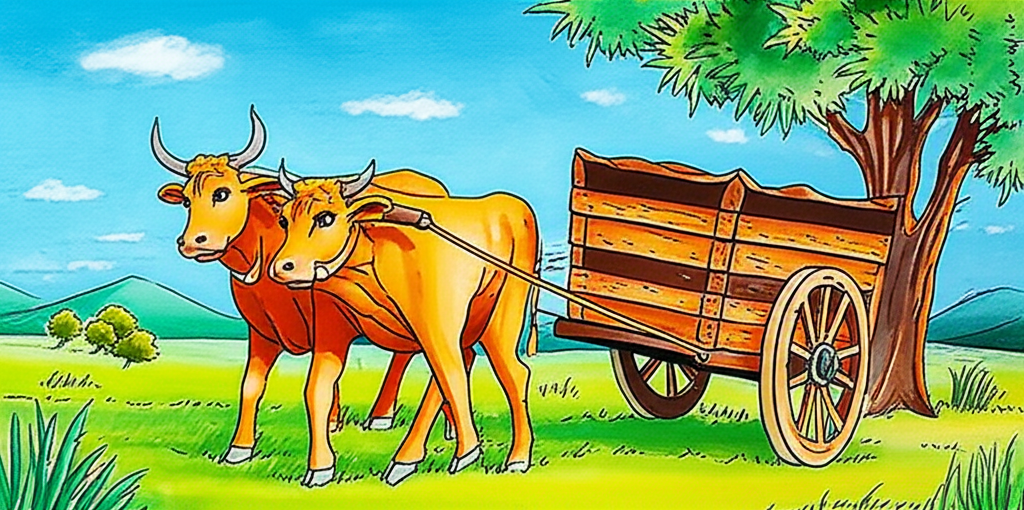
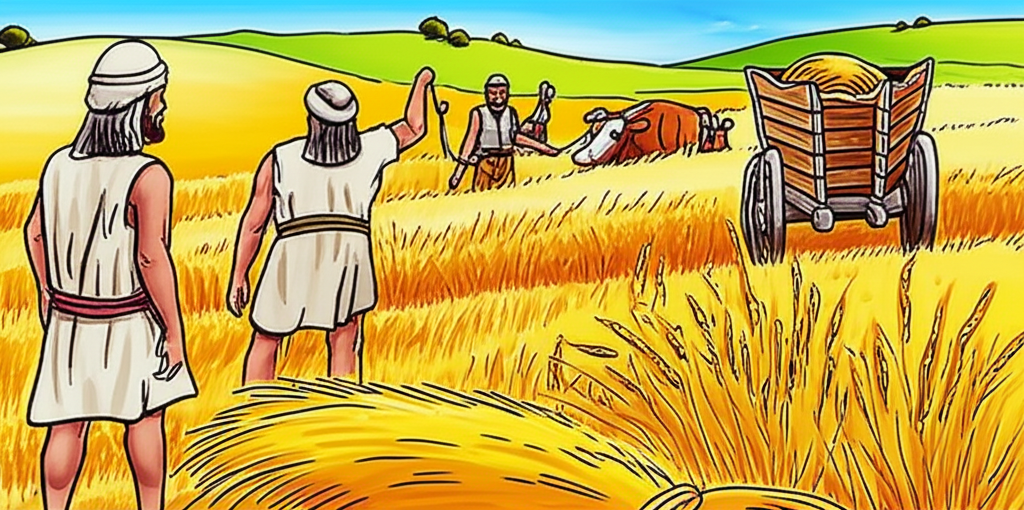
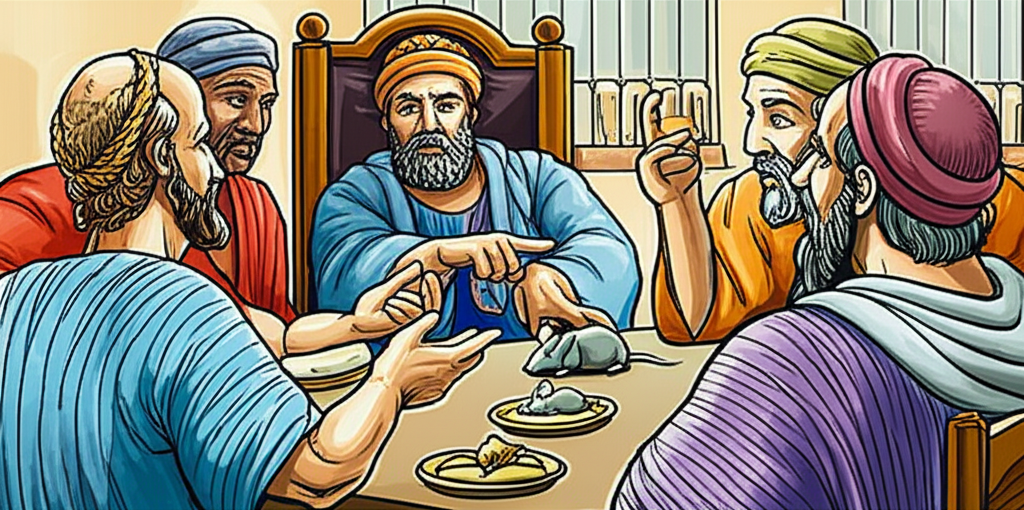

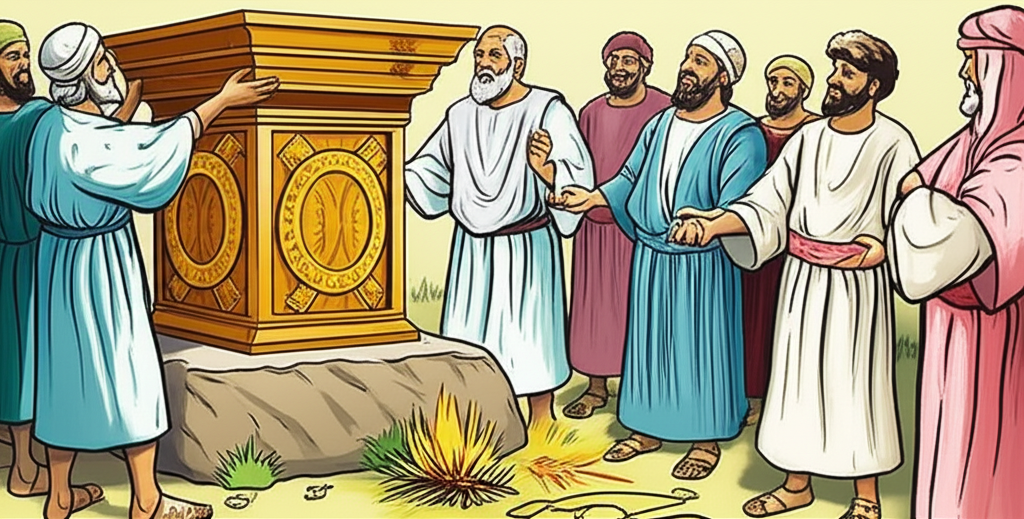
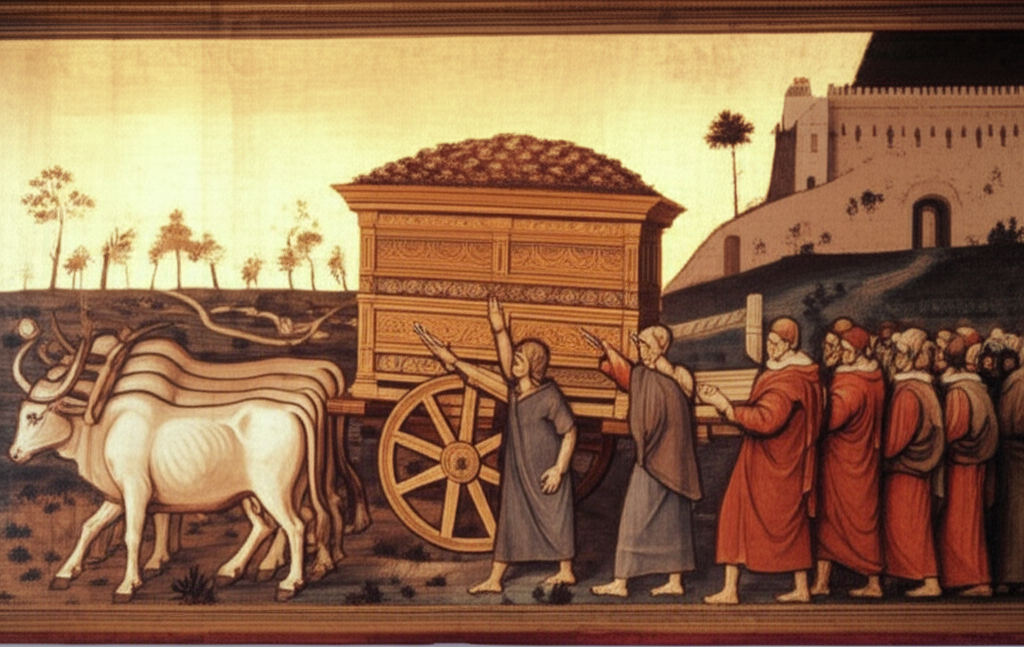
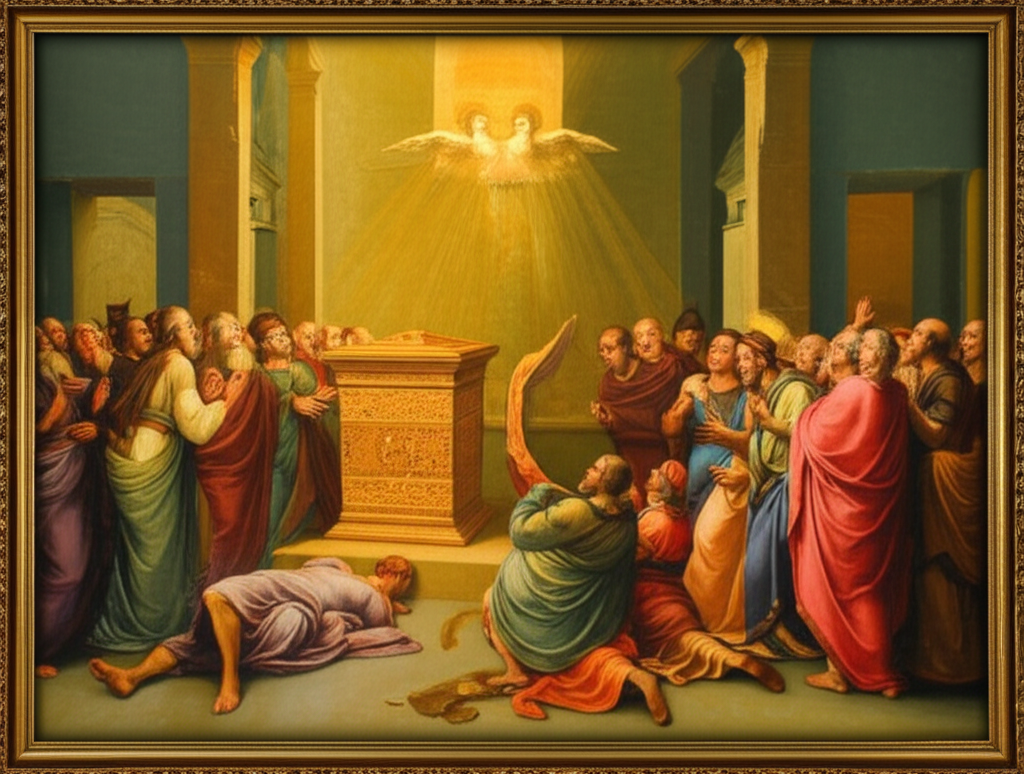
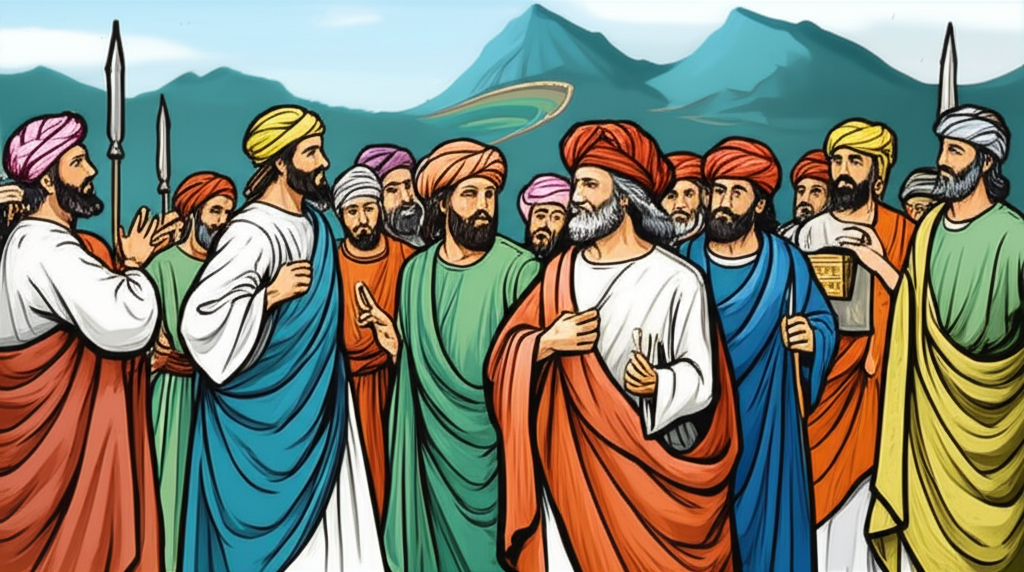
1 Samuel chapter 6 kjv
- 1 And the ark of the LORD was in the country of the Philistines seven months.
- 2 And the Philistines called for the priests and the diviners, saying, What shall we do to the ark of the LORD? tell us wherewith we shall send it to his place.
- 3 And they said, If ye send away the ark of the God of Israel, send it not empty; but in any wise return him a trespass offering: then ye shall be healed, and it shall be known to you why his hand is not removed from you.
- 4 Then said they, What shall be the trespass offering which we shall return to him? They answered, Five golden emerods, and five golden mice, according to the number of the lords of the Philistines: for one plague was on you all, and on your lords.
- 5 Wherefore ye shall make images of your emerods, and images of your mice that mar the land; and ye shall give glory unto the God of Israel: peradventure he will lighten his hand from off you, and from off your gods, and from off your land.
- 6 Wherefore then do ye harden your hearts, as the Egyptians and Pharaoh hardened their hearts? when he had wrought wonderfully among them, did they not let the people go, and they departed?
- 7 Now therefore make a new cart, and take two milch kine, on which there hath come no yoke, and tie the kine to the cart, and bring their calves home from them:
- 8 And take the ark of the LORD, and lay it upon the cart; and put the jewels of gold, which ye return him for a trespass offering, in a coffer by the side thereof; and send it away, that it may go.
- 9 And see, if it goeth up by the way of his own coast to Bethshemesh, then he hath done us this great evil: but if not, then we shall know that it is not his hand that smote us: it was a chance that happened to us.
- 10 And the men did so; and took two milch kine, and tied them to the cart, and shut up their calves at home:
- 11 And they laid the ark of the LORD upon the cart, and the coffer with the mice of gold and the images of their emerods.
- 12 And the kine took the straight way to the way of Bethshemesh, and went along the highway, lowing as they went, and turned not aside to the right hand or to the left; and the lords of the Philistines went after them unto the border of Bethshemesh.
- 13 And they of Bethshemesh were reaping their wheat harvest in the valley: and they lifted up their eyes, and saw the ark, and rejoiced to see it.
- 14 And the cart came into the field of Joshua, a Bethshemite, and stood there, where there was a great stone: and they clave the wood of the cart, and offered the kine a burnt offering unto the LORD.
- 15 And the Levites took down the ark of the LORD, and the coffer that was with it, wherein the jewels of gold were, and put them on the great stone: and the men of Bethshemesh offered burnt offerings and sacrificed sacrifices the same day unto the LORD.
- 16 And when the five lords of the Philistines had seen it, they returned to Ekron the same day.
- 17 And these are the golden emerods which the Philistines returned for a trespass offering unto the LORD; for Ashdod one, for Gaza one, for Askelon one, for Gath one, for Ekron one;
- 18 And the golden mice, according to the number of all the cities of the Philistines belonging to the five lords, both of fenced cities, and of country villages, even unto the great stone of Abel, whereon they set down the ark of the LORD: which stone remaineth unto this day in the field of Joshua, the Bethshemite.
- 19 And he smote the men of Bethshemesh, because they had looked into the ark of the LORD, even he smote of the people fifty thousand and threescore and ten men: and the people lamented, because the LORD had smitten many of the people with a great slaughter.
- 20 And the men of Bethshemesh said, Who is able to stand before this holy LORD God? and to whom shall he go up from us?
- 21 And they sent messengers to the inhabitants of Kirjathjearim, saying, The Philistines have brought again the ark of the LORD; come ye down, and fetch it up to you.
1 Samuel chapter 6 nkjv
- 1 Now the ark of the LORD was in the country of the Philistines seven months.
- 2 And the Philistines called for the priests and the diviners, saying, "What shall we do with the ark of the LORD? Tell us how we should send it to its place."
- 3 So they said, "If you send away the ark of the God of Israel, do not send it empty; but by all means return it to Him with a trespass offering. Then you will be healed, and it will be known to you why His hand is not removed from you."
- 4 Then they said, "What is the trespass offering which we shall return to Him?" They answered, "Five golden tumors and five golden rats, according to the number of the lords of the Philistines. For the same plague was on all of you and on your lords.
- 5 Therefore you shall make images of your tumors and images of your rats that ravage the land, and you shall give glory to the God of Israel; perhaps He will lighten His hand from you, from your gods, and from your land.
- 6 Why then do you harden your hearts as the Egyptians and Pharaoh hardened their hearts? When He did mighty things among them, did they not let the people go, that they might depart?
- 7 Now therefore, make a new cart, take two milk cows which have never been yoked, and hitch the cows to the cart; and take their calves home, away from them.
- 8 Then take the ark of the LORD and set it on the cart; and put the articles of gold which you are returning to Him as a trespass offering in a chest by its side. Then send it away, and let it go.
- 9 And watch: if it goes up the road to its own territory, to Beth Shemesh, then He has done us this great evil. But if not, then we shall know that it is not His hand that struck us?it happened to us by chance."
- 10 Then the men did so; they took two milk cows and hitched them to the cart, and shut up their calves at home.
- 11 And they set the ark of the LORD on the cart, and the chest with the gold rats and the images of their tumors.
- 12 Then the cows headed straight for the road to Beth Shemesh, and went along the highway, lowing as they went, and did not turn aside to the right hand or the left. And the lords of the Philistines went after them to the border of Beth Shemesh.
- 13 Now the people of Beth Shemesh were reaping their wheat harvest in the valley; and they lifted their eyes and saw the ark, and rejoiced to see it.
- 14 Then the cart came into the field of Joshua of Beth Shemesh, and stood there; a large stone was there. So they split the wood of the cart and offered the cows as a burnt offering to the LORD.
- 15 The Levites took down the ark of the LORD and the chest that was with it, in which were the articles of gold, and put them on the large stone. Then the men of Beth Shemesh offered burnt offerings and made sacrifices the same day to the LORD.
- 16 So when the five lords of the Philistines had seen it, they returned to Ekron the same day.
- 17 These are the golden tumors which the Philistines returned as a trespass offering to the LORD: one for Ashdod, one for Gaza, one for Ashkelon, one for Gath, one for Ekron;
- 18 and the golden rats, according to the number of all the cities of the Philistines belonging to the five lords, both fortified cities and country villages, even as far as the large stone of Abel on which they set the ark of the LORD, which stone remains to this day in the field of Joshua of Beth Shemesh.
- 19 Then He struck the men of Beth Shemesh, because they had looked into the ark of the LORD. He struck fifty thousand and seventy men of the people, and the people lamented because the LORD had struck the people with a great slaughter.
- 20 And the men of Beth Shemesh said, "Who is able to stand before this holy LORD God? And to whom shall it go up from us?"
- 21 So they sent messengers to the inhabitants of Kirjath Jearim, saying, "The Philistines have brought back the ark of the LORD; come down and take it up with you."
1 Samuel chapter 6 niv
- 1 When the ark of the LORD had been in Philistine territory seven months,
- 2 the Philistines called for the priests and the diviners and said, "What shall we do with the ark of the LORD? Tell us how we should send it back to its place."
- 3 They answered, "If you return the ark of the god of Israel, do not send it back to him without a gift; by all means send a guilt offering to him. Then you will be healed, and you will know why his hand has not been lifted from you."
- 4 The Philistines asked, "What guilt offering should we send to him?" They replied, "Five gold tumors and five gold rats, according to the number of the Philistine rulers, because the same plague has struck both you and your rulers.
- 5 Make models of the tumors and of the rats that are destroying the country, and give glory to Israel's god. Perhaps he will lift his hand from you and your gods and your land.
- 6 Why do you harden your hearts as the Egyptians and Pharaoh did? When Israel's god dealt harshly with them, did they not send the Israelites out so they could go on their way?
- 7 "Now then, get a new cart ready, with two cows that have calved and have never been yoked. Hitch the cows to the cart, but take their calves away and pen them up.
- 8 Take the ark of the LORD and put it on the cart, and in a chest beside it put the gold objects you are sending back to him as a guilt offering. Send it on its way,
- 9 but keep watching it. If it goes up to its own territory, toward Beth Shemesh, then the LORD has brought this great disaster on us. But if it does not, then we will know that it was not his hand that struck us but that it happened to us by chance."
- 10 So they did this. They took two such cows and hitched them to the cart and penned up their calves.
- 11 They placed the ark of the LORD on the cart and along with it the chest containing the gold rats and the models of the tumors.
- 12 Then the cows went straight up toward Beth Shemesh, keeping on the road and lowing all the way; they did not turn to the right or to the left. The rulers of the Philistines followed them as far as the border of Beth Shemesh.
- 13 Now the people of Beth Shemesh were harvesting their wheat in the valley, and when they looked up and saw the ark, they rejoiced at the sight.
- 14 The cart came to the field of Joshua of Beth Shemesh, and there it stopped beside a large rock. The people chopped up the wood of the cart and sacrificed the cows as a burnt offering to the LORD.
- 15 The Levites took down the ark of the LORD, together with the chest containing the gold objects, and placed them on the large rock. On that day the people of Beth Shemesh offered burnt offerings and made sacrifices to the LORD.
- 16 The five rulers of the Philistines saw all this and then returned that same day to Ekron.
- 17 These are the gold tumors the Philistines sent as a guilt offering to the LORD?one each for Ashdod, Gaza, Ashkelon, Gath and Ekron.
- 18 And the number of the gold rats was according to the number of Philistine towns belonging to the five rulers?the fortified towns with their country villages. The large rock on which the Levites set the ark of the LORD is a witness to this day in the field of Joshua of Beth Shemesh.
- 19 But God struck down some of the inhabitants of Beth Shemesh, putting seventy of them to death because they looked into the ark of the LORD. The people mourned because of the heavy blow the LORD had dealt them.
- 20 And the people of Beth Shemesh asked, "Who can stand in the presence of the LORD, this holy God? To whom will the ark go up from here?"
- 21 Then they sent messengers to the people of Kiriath Jearim, saying, "The Philistines have returned the ark of the LORD. Come down and take it up to your town."
1 Samuel chapter 6 esv
- 1 The ark of the LORD was in the country of the Philistines seven months.
- 2 And the Philistines called for the priests and the diviners and said, "What shall we do with the ark of the LORD? Tell us with what we shall send it to its place."
- 3 They said, "If you send away the ark of the God of Israel, do not send it empty, but by all means return him a guilt offering. Then you will be healed, and it will be known to you why his hand does not turn away from you."
- 4 And they said, "What is the guilt offering that we shall return to him?" They answered, "Five golden tumors and five golden mice, according to the number of the lords of the Philistines, for the same plague was on all of you and on your lords.
- 5 So you must make images of your tumors and images of your mice that ravage the land, and give glory to the God of Israel. Perhaps he will lighten his hand from off you and your gods and your land.
- 6 Why should you harden your hearts as the Egyptians and Pharaoh hardened their hearts? After he had dealt severely with them, did they not send the people away, and they departed?
- 7 Now then, take and prepare a new cart and two milk cows on which there has never come a yoke, and yoke the cows to the cart, but take their calves home, away from them.
- 8 And take the ark of the LORD and place it on the cart and put in a box at its side the figures of gold, which you are returning to him as a guilt offering. Then send it off and let it go its way
- 9 and watch. If it goes up on the way to its own land, to Beth-shemesh, then it is he who has done us this great harm, but if not, then we shall know that it is not his hand that struck us; it happened to us by coincidence."
- 10 The men did so, and took two milk cows and yoked them to the cart and shut up their calves at home.
- 11 And they put the ark of the LORD on the cart and the box with the golden mice and the images of their tumors.
- 12 And the cows went straight in the direction of Beth-shemesh along one highway, lowing as they went. They turned neither to the right nor to the left, and the lords of the Philistines went after them as far as the border of Beth-shemesh.
- 13 Now the people of Beth-shemesh were reaping their wheat harvest in the valley. And when they lifted up their eyes and saw the ark, they rejoiced to see it.
- 14 The cart came into the field of Joshua of Beth-shemesh and stopped there. A great stone was there. And they split up the wood of the cart and offered the cows as a burnt offering to the LORD.
- 15 And the Levites took down the ark of the LORD and the box that was beside it, in which were the golden figures, and set them upon the great stone. And the men of Beth-shemesh offered burnt offerings and sacrificed sacrifices on that day to the LORD.
- 16 And when the five lords of the Philistines saw it, they returned that day to Ekron.
- 17 These are the golden tumors that the Philistines returned as a guilt offering to the LORD: one for Ashdod, one for Gaza, one for Ashkelon, one for Gath, one for Ekron,
- 18 and the golden mice, according to the number of all the cities of the Philistines belonging to the five lords, both fortified cities and unwalled villages. The great stone beside which they set down the ark of the LORD is a witness to this day in the field of Joshua of Beth-shemesh.
- 19 And he struck some of the men of Beth-shemesh, because they looked upon the ark of the LORD. He struck seventy men of them, and the people mourned because the LORD had struck the people with a great blow.
- 20 Then the men of Beth-shemesh said, "Who is able to stand before the LORD, this holy God? And to whom shall he go up away from us?"
- 21 So they sent messengers to the inhabitants of Kiriath-jearim, saying, "The Philistines have returned the ark of the LORD. Come down and take it up to you."
1 Samuel chapter 6 nlt
- 1 The Ark of the LORD remained in Philistine territory seven months in all.
- 2 Then the Philistines called in their priests and diviners and asked them, "What should we do about the Ark of the LORD? Tell us how to return it to its own country."
- 3 "Send the Ark of the God of Israel back with a gift," they were told. "Send a guilt offering so the plague will stop. Then, if you are healed, you will know it was his hand that caused the plague."
- 4 "What sort of guilt offering should we send?" they asked. And they were told, "Since the plague has struck both you and your five rulers, make five gold tumors and five gold rats, just like those that have ravaged your land.
- 5 Make these things to show honor to the God of Israel. Perhaps then he will stop afflicting you, your gods, and your land.
- 6 Don't be stubborn and rebellious as Pharaoh and the Egyptians were. By the time God was finished with them, they were eager to let Israel go.
- 7 "Now build a new cart, and find two cows that have just given birth to calves. Make sure the cows have never been yoked to a cart. Hitch the cows to the cart, but shut their calves away from them in a pen.
- 8 Put the Ark of the LORD on the cart, and beside it place a chest containing the gold rats and gold tumors you are sending as a guilt offering. Then let the cows go wherever they want.
- 9 If they cross the border of our land and go to Beth-shemesh, we will know it was the LORD who brought this great disaster upon us. If they don't, we will know it was not his hand that caused the plague. It came simply by chance."
- 10 So these instructions were carried out. Two cows were hitched to the cart, and their newborn calves were shut up in a pen.
- 11 Then the Ark of the LORD and the chest containing the gold rats and gold tumors were placed on the cart.
- 12 And sure enough, without veering off in other directions, the cows went straight along the road toward Beth-shemesh, lowing as they went. The Philistine rulers followed them as far as the border of Beth-shemesh.
- 13 The people of Beth-shemesh were harvesting wheat in the valley, and when they saw the Ark, they were overjoyed!
- 14 The cart came into the field of a man named Joshua and stopped beside a large rock. So the people broke up the wood of the cart for a fire and killed the cows and sacrificed them to the LORD as a burnt offering.
- 15 Several men of the tribe of Levi lifted the Ark of the LORD and the chest containing the gold rats and gold tumors from the cart and placed them on the large rock. Many sacrifices and burnt offerings were offered to the LORD that day by the people of Beth-shemesh.
- 16 The five Philistine rulers watched all this and then returned to Ekron that same day.
- 17 The five gold tumors sent by the Philistines as a guilt offering to the LORD were gifts from the rulers of Ashdod, Gaza, Ashkelon, Gath, and Ekron.
- 18 The five gold rats represented the five Philistine towns and their surrounding villages, which were controlled by the five rulers. The large rock at Beth-shemesh, where they set the Ark of the LORD, still stands in the field of Joshua as a witness to what happened there.
- 19 But the LORD killed seventy men from Beth-shemesh because they looked into the Ark of the LORD. And the people mourned greatly because of what the LORD had done.
- 20 "Who is able to stand in the presence of the LORD, this holy God?" they cried out. "Where can we send the Ark from here?"
- 21 So they sent messengers to the people at Kiriath-jearim and told them, "The Philistines have returned the Ark of the LORD. Come here and get it!"
- Bible Book of 1 Samuel
- 1 Story of Hannah
- 2 Hannah's song and Prayer
- 3 Story of Samuel
- 4 The Philistines Capture the Ark
- 5 The Philistines and the Ark
- 6 The Ark Returned to Israel
- 7 Samuel Judges Israel
- 8 Israel Asks for a King
- 9 Saul the first king of Israel
- 10 Samuel Anoints Saul as King
- 11 Saul Defeats the Ammonites
- 12 Samuel's Farewell Address
- 13 Saul Fights the Philistines
- 14 Story of Jonathan
- 15 Saul and the Amalekites
- 16 David annointed
- 17 David and Goliath story
- 18 David and Jonathan's Friendship
- 19 Saul Tries to Kill David
- 20 Jonathan Warns David
- 21 David and the Holy Bread
- 22 David in the cav of Adullam
- 23 David Saves the City of Keilah
- 24 David Spares Saul's Life
- 25 Death of Samuel and Abigail
- 26 David Spares Saul Again
- 27 David Flees to the Philistines
- 28 Saul consults the Witch of Endor
- 29 The Philistines Reject David
- 30 David's Wives Are Captured
- 31 Death of Saul